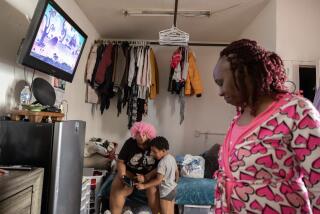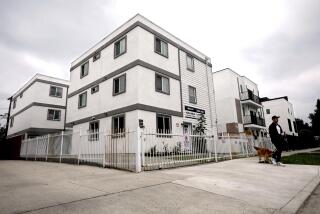Siege at AIDS Home Further Divides Neighborhood
- Share via
With police surrounding the block near 12th Avenue and Venice Boulevard, and the reeking smell of tear gas still heavy in the night air, neighbors Jose Rivas and Jose Vidal stood on a curb and screamed at one another.
They were screaming about a home for AIDS victims that has operated on their block since early last year, dividing the neighborhood between those who want the place shut down and those who support the six-bed home and the two dozen patients who have lived there.
This was Tuesday night, and Rivas’ and Vidal’s neighborhood had been hit anew by an ugly incident involving one of the home’s tenants. For three hours Tuesday, Alberto Alvizuri had shot at police officers, who in turn evacuated the block and settled in for a siege of tear gas that ended when Alvizuri took his life.
“They go crazy,” Rivas, 19, said of the AIDS patients. “They walk down the street screaming and crying. They talk to themselves. They go down to the doughnut shop every morning screaming and crying.”
“You’re wrong,” shot back Vidal, a father of three who lives across from the Casa de Nuestra Senora facility. “They are good people. They are our neighbors too.”
The neighborhood rift has festered for months. Petitions were circulated to have the facility removed. A second petition was discussed when rumors surfaced that a similar facility would open nearby. Some residents who had been tolerant of their sick neighbors changed their minds Tuesday after witnessing the gun battle.
The conflict in the racially mixed Mid-City neighborhood is not unlike others that have played out across greater Los Angeles. When an AIDS hospice prepared to open in Silver Lake, for instance, an angry resident dispatched a nasty letter attacking gays, whose population generally has been hit hardest in this country by AIDS.
“You guys are like a cancer that just keeps creeping along and rotting everything it touches,” the letter said.
When the Hughes House hospice prepared to open on Ogden Drive in Hollywood two years ago, one community leader received 25 phone calls a day from angry neighbors concerned about their property values.
More residents complained, city inspectors visited the site three times and Inspector R. L. Steinbach concluded that while the facility was “a little unusual for the average single-family neighborhood,” it did not violate local zoning laws.
But residents persisted. They maintained lengthy logs of activity at the shelter, jotting down notes every time a new medical supply truck pulled up outside or a hearse drove away. The neighbors took their case to the Board of Zoning Appeals, but lost when the panel voted to allow the shelter to continue to operate.
Advocates of hospices for AIDS patients say the facilities provide a less institutional and more informal setting than a hospital, along with medical care that is less costly.
Christie Cowell, a county AIDS program official, said there are 18 hospices or shelter facilities in Los Angeles County. While some cater to terminally ill residents, others provide care for specific patients, such as children with AIDS or people with AIDS and other problems, such as mental illness or drug dependency.
She said the county spends $2 million a year on funding the hospice programs. Since 1981, she said, there have been slightly more than 10,000 confirmed AIDS cases in the county.
Although she is sympathetic to the concerns of residents who live near an AIDS hospice, Cowell said it defies current medical knowledge for people to fear that they will become infected.
“You don’t get AIDS by living next door to someone who has it,” she said.
Nonetheless, along 12th Avenue, many residents were complaining Tuesday night that AIDS patients use public telephones on the corner, eat at a popular doughnut shop around the block and allow children to play in the front yard of the shelter.
Despite such concerns, Nancy Delgado, a supervisor for the county AIDS Program Office, said her agency has never received a formal complaint from neighbors against the Casa de Nuestra Senora, which she said began operating under a contract with the county about a year and a half ago. She said a staff member visited the shelter half an hour before the shooting started and saw no signs of impending violence.
“Everything was fine,” Delgado said. “It was a really well-organized operation.”
Representatives of some AIDS hospices said Wednesday that they have been welcomed into neighborhoods. Lee Rubio, residential manager for the Padua House, an AIDS hospice in Long Beach, said “we’ve had no form of harassment.”
“The way clients come into the house is not a problem and when they expire and leave the house, they go out the back door,” Rubio said. “The mortuary car pulls in the back and nobody sees what’s going on.”
Keith Malone, director of government relations for the AIDS Health Care Foundation, which operates a hospice in Elysian Park and an annex in Hollywood, said the key to winning neighborhood acceptance is candor.
“You want to let people know you’re there, to be up front about it,” he said.
He added that while the incident Tuesday apparently was an isolated episode of violence, the potential for such tragedies has been in the minds of many AIDS care providers.
More to Read
Sign up for Essential California
The most important California stories and recommendations in your inbox every morning.
You may occasionally receive promotional content from the Los Angeles Times.














